By Jonathan Goos - Posted at Continuing Reformation:
Everyone knows John Calvin. He is beloved and reviled; the object of praise and respect and the object of scorn and resentment. John Calvin is claimed by Reformed Christians, the Church of England, the Free Will Baptists and Westboro Baptist Church. Indeed, Calvinism has become an utterly useless term. Those who claim to be Calvinists sometimes have little to no relation to each other whatsoever. In his article “Calvin and Calvinism,” Carl Trueman states, “we need to understand that the term ‘Calvinism’ is profoundly unhelpful. It was coined as a polemical tool for tarnishing the reputation of the Reformed, and it is of no real use to modern intellectual history.” (The Cambridge Companion to John Calvin, Ch. 13) Love him or hate him, John Calvin’s writings continue to shape and change the world as they did during the Reformation.
Born in Noyon, Picardy in France, John Calvin grew up in a changing world. Renaissance humanism had opened the door to new ideas and Calvin embraced them as he studied for the priesthood and later turned to law at his father’s bidding. Neither really suited Calvin’s aspirations even though he went to some of the finest schools France had to offer. These included the Collège de Montaigu for his priesthood training and Orlèans and Bourges for law. As church historian David Calhoun put it, “He did not want to be priest, and he did not want to be a lawyer either. Young John Calvin wanted to be a scholar. He wanted to write books and have people read them.” (“Business with God: The Life of John Calvin”) Calvin wrote On Mercy as a discourse of Seneca to little reception in 1532 and also started to really delve into the writings of Martin Luther. Calvin’s appropriation of Luther and continued interest in studying the scriptures put him in a place that was ripe for controversy and reformation.
 |
| “John Calvin” Believed to be authored by Hans Holbein c. 1540 Hekman Digital Archive. |
Everyone knows John Calvin. He is beloved and reviled; the object of praise and respect and the object of scorn and resentment. John Calvin is claimed by Reformed Christians, the Church of England, the Free Will Baptists and Westboro Baptist Church. Indeed, Calvinism has become an utterly useless term. Those who claim to be Calvinists sometimes have little to no relation to each other whatsoever. In his article “Calvin and Calvinism,” Carl Trueman states, “we need to understand that the term ‘Calvinism’ is profoundly unhelpful. It was coined as a polemical tool for tarnishing the reputation of the Reformed, and it is of no real use to modern intellectual history.” (The Cambridge Companion to John Calvin, Ch. 13) Love him or hate him, John Calvin’s writings continue to shape and change the world as they did during the Reformation.
 |
| John Calvin – T Woolnoth after Cornelis Danckerts – 19th Century Hekman Digital Archives. |